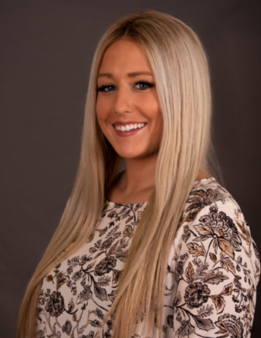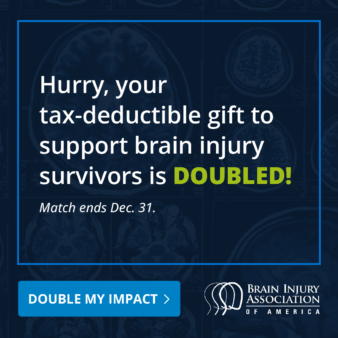CBIS Spotlight: Karley Brouwer
Categories: ACBIS Insider
 Karley Brouwer is a Certified Therapeutic Recreational Specialist (CTRS) and Recreational Therapy Supervisor at Origami Rehabilitation in Mason, Mich. In addition, she is a Recreational Therapist at Rehab Without Walls in Michigan providing Home and Community based recreational therapy. Karley graduated from Grand Valley State University in 2017 with a Bachelor of Science in Recreational Therapy. She obtained her Certified Brain Injury Specialist (CBIS) certification in 2019 and has worked with the Brain Injury population specifically since 2018. Karley maintains her CTRS credential, Certified Dementia Practitioner (CDP), CBIS certification, and is currently completing training for becoming a 200-hour certified yoga teacher. Karley also completed the LoveYourBrain Yoga teacher training in 2018 and has implemented the research-based yoga program for individuals who have experienced a brain injury, and their caregivers, over the years.
Karley Brouwer is a Certified Therapeutic Recreational Specialist (CTRS) and Recreational Therapy Supervisor at Origami Rehabilitation in Mason, Mich. In addition, she is a Recreational Therapist at Rehab Without Walls in Michigan providing Home and Community based recreational therapy. Karley graduated from Grand Valley State University in 2017 with a Bachelor of Science in Recreational Therapy. She obtained her Certified Brain Injury Specialist (CBIS) certification in 2019 and has worked with the Brain Injury population specifically since 2018. Karley maintains her CTRS credential, Certified Dementia Practitioner (CDP), CBIS certification, and is currently completing training for becoming a 200-hour certified yoga teacher. Karley also completed the LoveYourBrain Yoga teacher training in 2018 and has implemented the research-based yoga program for individuals who have experienced a brain injury, and their caregivers, over the years.
Why have you chosen a career in brain injury? Why are you passionate about brain injury?
I have always had significant interest and fascination with physical rehabilitation, as well as individualized holistic care. With this, I found Recreational Therapy to be extremely fitting for my career focusing on mitigating symptoms experienced through leisure/recreational pursuits (i.e.: utilizing art or woodworking to address fine motor skills or depression) and to address return to leisure/recreational engagement based upon each individual’s interest and lifestyle (i.e.: return to kayaking or golfing post injury). Rehabilitation is transformative and Recreational Therapy is able to provide a profound functional impact.
Through working within Recreational Therapy and Physical Medicine and Rehabilitation, I have found my love for working with those who have experienced brain injury. The brain is such a fascinating, intricate, and miraculous organ. And brain injury rehabilitation can be transformative and remarkable. Supporting individuals through a time of uncertainty, fostering step-wise improvements, and helping them regain access to their passions or explore new interests post-injury is a privilege I deeply value.
How has the field of brain injury changed in your time working?
Within my experience, the brain injury field has become more individualized focusing on functional treatment, has increased advocacy efforts, and found notable research outcomes. Therapy, and overall medical care, has become increasingly focused on addressing individual needs and symptoms, meeting the individual where they are at, and ensuring the progress made carries over directly to their daily life. Advocacy has significantly increased through programs such as the HEADS UP program from the CDC for sport coaches, Concussion Awareness Now (CAN) initiatives including televised ads, and other efforts from the local community level to internationally. Research outcomes have been tremendous including biomarker testing which measure, diagnose, and predict outcomes for traumatic brain injuries, allowing for potential reduced use of imaging, increased efficiency in detection, and reduced costs.
Why is having CBIS important to you? How is it helpful in your daily work?
Obtaining the CBIS credential provided me the opportunity to gain expertise within the area of brain injury and continue to further my knowledge through the use of specialized continuing education sessions and resources. The CBIS credential is well respected and shines within the community and workplace. It is important to me that clients and families know that their services are individualized, as well as provided at a higher standard through additional training of the CBIS. It is helpful to be connected to a greater community of practitioners, resources, events, expertise to enhance the care that I provide and the advocacy that I engage in.
How can clinicians best support individuals with brain injury, caregivers, and family members?
Meet the client, caregivers, and family members where they are at. One of my common reminders to myself and others is: Clinicians should morph themselves into what the client needs within each moment. What this means to me is listening, supporting, encouraging them through the highs and the lows. Reminding them of their progress made and being a bright ray within this difficult time of their life. It’s easy as a clinician to have our treatment plans set up and to expect completion in our sessions of what we had planned, but it’s most important to meet the client where they are at, listen, encourage, and support them. Overall, I think providing a supportive, accepting, and educational rehabilitative experience. Involving family members and/or caregivers throughout the process, listening to and embracing each individual, and advocating for and alongside them. Clinicians provide care to individuals who never planned to be seeking our services, likely in the grieving process due to their brain injury and symptoms they are experiencing.
How is the spirit of community important to the brain injury community (survivors and clinicians)?
Community plays a profound role in the healing journey for clients and clinicians. Clinicians have the ability, and I believe, the responsibility, to ensure the client is able to access and interact within the community. Community re-integration could include return to productive activity such as volunteering, going to work or school, engaging in leisure/recreational pursuits of the clients interest, attending religious gatherings or events, joining a support group, club, or organization. Community involvement has numerous benefits, some of which include social support, coping strategies, social connection, physical activity, cognitive stimulation, and more.
What do you see as the future of the brain injury field/research/education?
I foresee continued improvements in identifying brain injuries potentially through biomarkers or maybe other ways as well in which improve efficiency, decrease cost, and reduce risks (i.e.: radiation). I also hope to see more preventative measures taken to protect individuals from brain injury in sports, falls, motor vehicle accidents. And I envision a community who is more cognizant of invisible diagnoses such as brain injury or mental health conditions, allowing for more knowledge, acceptance, support, and care to those who are experiencing non-visible conditions.
Are you involved with BIAA or ACBIS in other ways?
I have attended the local chapter, Brain Injury Association of Michigan (BIAMI), annual conference for many years. I have also provided presentations at the BIAMI Annual Conference!

